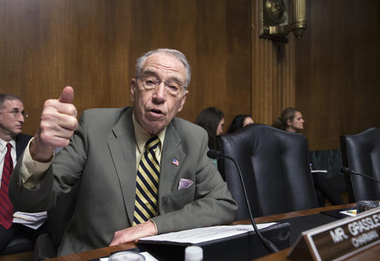Amid Supreme Court battle, Grassley seeks friendly audience

OCHEYEDAN, Iowa (AP) — As chairman of the Senate Judiciary Committee, Sen. Charles Grassley stands at the center of the battle over President Barack Obama's Supreme Court nominee. The powerful Iowa Republican has joined with others in his party and refused to hold confirmation hearings.
That position has drawn blistering criticism from Democrats in Washington and from chanting activists at rallies back home in Iowa, but Grassley will probably get a more welcome reception this week when he holds three town hall meetings in friendly conservative territory.
Some think it's no coincidence that the 82-year-old senator has chosen this time to hold public events more than 200 miles from far more liberal Des Moines or other urban areas.
"If I was on his staff, that's exactly what I'd tell him to do, said Iowa State University political science professor Steffen Schmidt. "The reason is right now is when there's going to be most controversy about this. It's a hot topic, and people are squirrely about it with demonstrations in Des Moines."
The first of Grassley's meetings was scheduled for Monday at a senior center in Ocheyedan, a city of 470 people in a Republican-dominated county where Grassley won more than 80 percent of the vote in his last two elections. On Tuesday, his sole public event is set in a neighboring county where 92 percent of voters backed him in 2010.
Grassley, who is seeking re-election to a seventh term in November, is also holding 16 private question-and-answer sessions at schools, service organizations and businesses during the Senate's 16-day spring holiday.
Aides to Grassley said it's business-as-usual for a politician first elected to the Iowa House in 1958 who has not faced a close election in decades. Although Iowa twice favored Obama in presidential elections, independents and even some Democrats typically support Grassley, who received nearly 65 percent of the vote in the 2010 general election and more than 70 percent in 2004.
Every year, he visits each of Iowa's 99 counties, a practice that has become known as "the full Grassley" and is often copied by politicians seeking statewide office, as well as some presidential candidates seeking support in the state's first-in-the-nation caucuses.
Although he's heavily favored to win re-election, Grassley's refusal to hold hearings for nominee Merrick Garland, a federal appeals court judge, has outraged some activists and prompted well-known former Lt. Gov. Patty Judge to belatedly seek the Democratic nomination to challenge Grassley.
Grassley "is acting like someone who has been in Washington for far too long," Judge said.
He has responded that it would be a waste of time to hold hearings when Garland has no chance of being confirmed.
"Checks and balances among three co-equal branches of government are crucial to our system of government and accountability," Grassley said in a statement. "Changing the direction of the Supreme Court for a generation is too important for the court, and the nominee, to get bogged down in politics."
In earlier town hall meetings in more liberal regions of Iowa, Grassley has been repeatedly questioned about the Supreme Court nomination. That could change in northwest Iowa, but activists said they will not be deterred by Grassley's choice of friendly territory.
"We are organizing, and we are going to have people at each of those town halls ready to ask him about the Supreme Court nomination," said Matt Sinovic, executive director of Progress Iowa and spokesman for Iowa Why Courts Matter, a coalition of several liberal organizations advocating for court system free from political influence.
In the first days after Justice Antonin Scalia's death last month, Grassley equivocated over whether he would allow the Senate Judiciary Committee to hold hearings on Obama's selection, telling Iowa radio reporters, "I would wait until the nominee is made before I would make any decision."
But a week later — well before Obama picked Garland — Grassley and the 10 other GOP members of the Judiciary panel released a letter stating that the committee would hold no hearings on an Obama nominee until after the president elected in November is sworn in, saying they wanted to "protect the will of the American people.
Ever since, Democrats looking to build pressure on Republicans in the Supreme Court fight have made Grassley their top target. Their hope is that he will reverse himself and allow committee hearings or jeopardize his hopes of being re-elected this November.
Senate Majority Leader Mitch McConnell has not budged on his insistence that no nominee will be considered until the next president offers one. McConnell has even rebuffed calls by a handful of GOP senators who have said the Senate could consider Garland in a postelection lame duck session should a Democrat be elected president in order to avoid facing a more liberal nominee from Hillary Clinton or Vermont Sen. Bernie Sanders.
By DAVID PITT, Associated Press. Copyright 2016 The Associated Press. All rights reserved. This material may not be published, broadcast, rewritten or redistributed.
The Gayly - 3/28/2016 @ 3:18 p.m. CST





